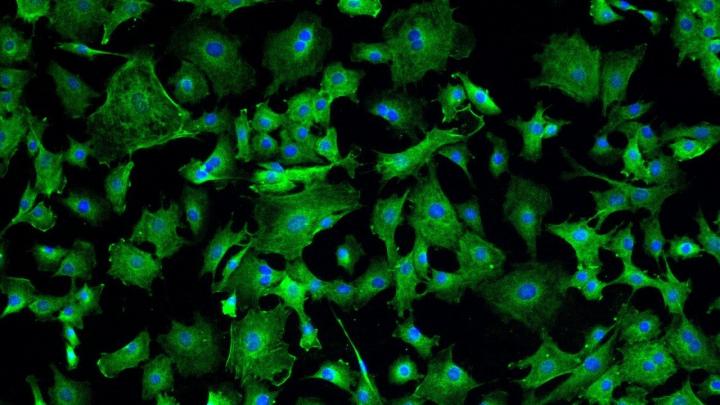Experimental treatment is designed to fight fatal immune response in coronavirus patients

Credit: Cedars-Sinai
LOS ANGELES — Four of six critically ill COVID-19 (coronavirus) patients significantly improved after receiving an experimental therapeutic designed to reduce inflammation, a major cause of death from this disease, according to a case series published by Cedars-Sinai and Capricor Therapeutics. The four patients got well enough to be discharged from the hospital.
The therapeutic, known as CAP-1002, contains cardiosphere-derived cells (CDCs) that are grown in the laboratory from human heart tissues. Previous preclinical and clinical research showed that the CDCs, originally created by a process developed to treat heart failure, can help the whole body.
Investigators emphasized that the patient outcomes, while encouraging, are not sufficient to prove that CAP-1002 is safe and effective for treating COVID-19 because this was not a clinical trial with a control group.
The case series, published today in the scientific journal Basic Research in Cardiology, is believed to be the first peer-reviewed report on using a cell therapy in critically ill COVID-19 patients, according to Eduardo Marbán, MD, PhD, executive director of the Smidt Heart Institute at Cedars-Sinai.
All six patients in the case series suffered from respiratory failure and required supplemental oxygen prior to receiving the cell therapy; five were on ventilators. Within four days after infusion with CAP-1002, four patients were able to breathe without respiratory support, and within less than three weeks, the four were well enough to be discharged from the hospital. As of April 28, the two other patients remained hospitalized in intensive care.
None of the patients showed adverse effects from the infusions, and none died during the study period. By comparison, six patients died among a group of 34 comparable COVID-19 patients who were treated in Cedars-Sinai’s intensive care unit around the same time but who did not receive the cell therapy.
The patients in the case series were treated at Cedars-Sinai under emergency use provisions, which allows use of therapies not yet approved by the Food and Drug Administration to treat seriously ill patients when no other treatments are available.
“Previous studies provided strong evidence that CDCs have intense benefits for the immune system and inflammation in a number of diseases,” Marbán explained, “They accomplish this by secreting exosomes- nanoscale vesicles with a variety of active contents that travel widely throughout the body.”
Marbán said this anti-inflammatory effect could be a critical boost for coronavirus patients. Current information, he explained, indicates that the body’s overreaction to the COVID-19 infection, rather than the virus itself, often delivers the fatal blow, especially in later stages of the disease.
“‘Friendly fire’ is what’s killing many coronavirus patients,” said Marbán, professor of Cardiology and co-author. “The immune system unleashes a so-called cytokine storm into the blood-overwhelming the body with infection-fighting proteins that can trigger multiple-organ failure and death.”
Raj Makkar, MD, the principal author, said the investigative team is planning a future clinical trial that would involve dividing a larger number of coronavirus patients into two groups: those who receive the therapy and a control who do not. The team would then compare the outcome for the two groups.
“The only way to establish the efficacy of our therapy is with a randomized clinical trial,” Makkar said. “That is because some coronavirus patients get better on their own with standard treatments.”
Makkar added that if the CDCs counteract immune overreaction in coronavirus patients, the cells potentially could help prevent or treat two other life-threatening conditions that often develop during the course of the disease: acute respiratory distress and inflammation of the heart muscle, known as myocarditis.
The emergency use treatment was conducted in collaboration with the biotechnology company Capricor Therapeutics in Los Angeles, which provided regulatory support and manufactured the experimental agent (CAP-1002).
###
Funding: Expenses to support this study and data analysis were funded by a gift from the Smidt Family Foundation.
Disclosures: The cardiosphere-derived cells used in these emergency use cases were derived from donor hearts and provided by Capricor Therapeutics. Marbán developed the process to grow CDCs when he was on the faculty of Johns Hopkins University; the process was further developed at Cedars-Sinai. Capricor has licensed the process from Johns Hopkins and from Cedars-Sinai for clinical and commercial development. Capricor has licensed additional intellectual property from Cedars-Sinai and the University of Rome. Cedars-Sinai and Marbán have financial interests in Capricor.
DOI: https:/
Read more in Discoveries Magazine: Young at Heart
Media Contact
Sally Stewart
[email protected]
Original Source
https:/
Related Journal Article
http://dx.




